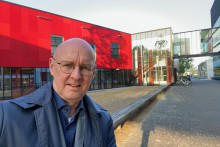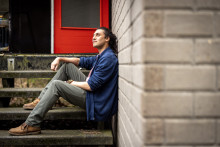How would you describe an Honours programme to somebody who has never heard of it?
‘It is extracurricular on top of your regular study. It is time consuming and you need to put effort in it. It addresses many multidisciplinary issues and it is more complex than a regular study. It allows you to meet people with the same attitude toward learning but from different faculties and gives you more freedom to choose your projects based on your interests. The core of it is being challenged, in this case academically challenged. It is a curiosity driven education. That is probably the best way to describe it. Debating and critical thinking are very important parts of it. You will develop skills that are not necessarily addressed in your regular education. It consists of 30 EC over 1,5 years for Bachelor tracks and 15 EC in one year for Master tracks.’
Who can apply and be accepted for it?
‘It is not for everyone. You need to be ambitious and motivated to do it. Motivation is key. We are targeting the top 10% of students but it is not all about grades. It is about your story. Good grades are important, because we don’t want you to neglect your regular study, but anyone can be an Honours student. It is about willingness to grow. When you apply, you can specify your preferred track and you are invited for a selection interview with the track coordinator and an Honours student. Then you need to explain why you want to be part of the Honours community.’
You said it requires hard work and a lot of time. What do you get in return?
‘You get a different attitude. You gain more confidence, more perseverance, you become an independent thinker and a leader – of yourself and others. You get what we call an “Honours attitude”. You see this change immediately. Students change during the programme. Besides the academic content, it is a lot about your personal development. Some tracks also offer a personal coach who focuses on the students’ personal goals and projects. Through this guidance, you become the person that inspires others and makes a difference. Because of this, the track is not just attractive for students but also for teachers. It is a different type of education. It is quite independent - which is nice but also challenging, because as a teacher you don’t know exactly where it’s going and you need to be creative.’
Is it all work or is it also fun?
‘It is also fun. You can find yourself in it. It is very rewarding for students to be recognized. They have a say in everything and can decide on their own education. And for teachers it’s interesting because they get new ideas from the students. It is a real community. We are working on getting housing and we try to involve everyone in formal and informal meetings.’

In your opinion, what drives students to participate?
‘For most students it’s intrinsic. It allows them to develop their talents and gives them something for their whole life. As an Honours student, you have a better possibility to make an impact. Moreover, it is a good thing for your resume, of course. For example, the Research track can help you speed up your PhD trajectory because you can use the 15 EC during your doctoral research.’
What do you think of its value for the rest of the university?
‘Honours students inspire other students and education innovation from within the programme will spread to the other programmes as well. Everyone’s educational needs are different. This specific group needs to be academically challenged and as a university we are responsible for their development.’
How do you envision the future of the talent track?
‘I believe it will become part of the general talent development of the university. We cannot see the future, but I think we will move towards an “Inspiration Lab” for students, teachers, companies and various other organizations.’







